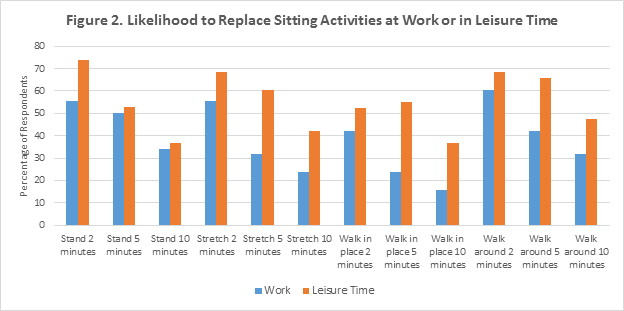Session Information
Date: Monday, October 22, 2018
Title: 4M117 ARHP Abstract: Pain, Anxiety, & Depression–ARHP I (1946–1951)
Session Type: ARHP Concurrent Abstract Session
Session Time: 4:30PM-6:00PM
Background/Purpose: Physical activity is beneficial for those with current or previous knee symptoms, yet few meet federal physical activity guidelines. Reducing sedentary time, which has harmful effects independent of physical activity, may be a more feasible approach to improve the health of this population. The purpose of this study was to identify beliefs about sedentary behavior, barriers to standing, and program preferences in adults with knee pain, knee osteoarthritis (KOA), or total knee replacement (TKR).
Methods: Adults ≥50 years with knee pain, KOA, or TKR were recruited via flyers, emails, social media, and healthcare professionals. Participants completed an online survey assessing demographics, pain and function (Patient-Reported Outcomes Measurement Information System [PROMIS]), time spent in moderate-to-strenuous physical activity (MVPA; Godin Leisure Time Exercise Questionnaire) and sitting (Sitting Time Questionnaire), beliefs about sedentary behavior, and preferences for a sedentary behavior reduction program.
Results: A total of 35 participants completed the survey (Table 1). TKR patients were older and experienced less pain than those with knee pain or KOA (P<0.05). Participants self-reported being sedentary 10.1±3.8 hours/day and engaging in 113.7±129.8 minutes/week of MVPA, with no differences between knee groups. The majority of participants own a computer (97.1%) and smartphone (82.9%). Most participants (82.9%) believe that reducing sitting time can improve health, with the majority believing brisk or light walking (91.4%) would be better than standing (65.7%) (Table 2). Over half (54.3%) of participants wish they could sit less. The most common barriers to standing were feeling pain/discomfort (48.6%) and inability to stand while using computer (48.6%) or watching TV (22.9%). Sixty-eight percent of participants were interested in participating in a sedentary reduction program and believed tracking sitting time (71%) and setting goals (67.7%) would be most helpful to reduce sitting time (Table 3).
Conclusion: Adults with knee pain, KOA, and TKR believe reducing sitting time could improve health. These results will help to inform the development of future sedentary reduction interventions tailored to the needs of those with current or past knee symptoms.
|
Table 1: Participant Characteristics |
|||
|
|
Overall n=35 |
Knee Pain or KOA n=25 |
Knee Replacement n=10 |
|
Age, years, mean ± SD |
61.6 ± 7.6 |
58.9 ± 5.6 |
68.5 ± 7.7 |
|
BMI, kg/m2, mean ± SD |
32.1 ± 7.5 |
31.2 ± 7.5 |
34.4 ± 7.4 |
|
Female, no. (%) |
24 (69%) |
14 (56%) |
10 (100%) |
|
Race, no. (%) White |
33 (94%) |
23 (92%) |
10 (100%) |
|
Education < College Degree ≥ College Degree |
10 (29%) 25 (71%) |
7 (28%) 18 (72%) |
3 (30%) 7 (70%) |
|
Employment Status Working Part or Full time Not working
|
20 (57%) 15 (43%)
|
18 (72%) 7 (28%)
|
3 (30%) 7 (70%)
|
|
Health Conditions Hypertension Diabetes Depression
|
15 (43%) 4 (11%) 6 (17%)
|
10 (40%) 4 (16%) 2 (8%)
|
5 (50%) – 4 (40%)
|
|
PROMIS Measures Mobility Pain Interference Pain Intensity
|
43.3 ± 4.7 44.2 ± 6.1 54.2 ± 6.1
|
43.3 ± 5.0 45.2 ± 6.3 55.8 ± 4.7
|
43.4 ± 4.1 41.6 ± 4.6 50.3 ± 7.4
|
|
Sedentary Behavior Average hours/day
|
10.1 ± 3.8
|
10.2 ± 3.8
|
9.7 ± 4.0
|
|
Physical Activity Average MVPA weekly |
113.7 ± 129.8 |
120.3 ± 142.9 |
97.0 ± 93.9 |
|
BMI: Boddy mass index KOA: Osteoarthritis MVPA: Moderate to vigorous intensity physical activity PROMIS: Patient-Reported Outcomes Measurement Information System |
|||
To cite this abstract in AMA style:
Pellegrini C, Powell S, Larsen C, Phillips S. Beliefs and Preferences for Reducing Sedentary Time in Those with Current or Past Knee Symptoms [abstract]. Arthritis Rheumatol. 2018; 70 (suppl 9). https://acrabstracts.org/abstract/beliefs-and-preferences-for-reducing-sedentary-time-in-those-with-current-or-past-knee-symptoms/. Accessed .« Back to 2018 ACR/ARHP Annual Meeting
ACR Meeting Abstracts - https://acrabstracts.org/abstract/beliefs-and-preferences-for-reducing-sedentary-time-in-those-with-current-or-past-knee-symptoms/


